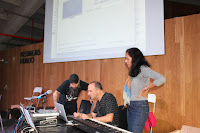"It is in changing that things find repose"
Heraclitus
This work was composed for violoncello and electronics in 2017. This video is an improvisation of the piece made by Paloma Carrasco López on the cello. It was part of the Luna de Octubre event, AVLAB Meetings, which held at Medialab Prado in Madrid, Spain, in October 2017.
· PRESS MATERIAL
This composition emerges from the ideas of the banal , the opposites that converge into one entity, and the flux of things.
Playing an open string is such a basic action that can often reach the banal. For me, the banal is all those things which are produced and presented to our senses, but which we do not usually perceive. It is also those things which are normally offered to us at any place and time, and for this very reason are almost never noticed.
Instead of an instrument belonging to the Western musical tradition, I have conceived the cello as a sound object, letting me create a lot of several sounds. I have set into motion a process of decomposition of the open string sound into its different harmonics, generating simultaneity and fluctuation between them since both the possibility and impossibility of controlling their outcomes. My intention has been the piece is produced between determinacy and chance at the same time, namely opposite things happen as part of the same entity simultaneously.
I have created a continuous flux since a series of cyclic transformations between its elements that, on the one hand it generates new identities, but on the other hand it destroys them: new partials and sonorities are constantly emerging while they are vanishing or fusing with others. I have determined that music comes to the same places as before, but always in a different way. I have also said that the bow motion on the different string points, its speed and pressure generate a process from light and consonant to dark and dissonant textures. My idea has been everything changes constantly, everything is subject to change, and for that very reason, everything stays static.
I have created a continuous flux since a series of cyclic transformations between its elements that, on the one hand it generates new identities, but on the other hand it destroys them: new partials and sonorities are constantly emerging while they are vanishing or fusing with others. I have determined that music comes to the same places as before, but always in a different way. I have also said that the bow motion on the different string points, its speed and pressure generate a process from light and consonant to dark and dissonant textures. My idea has been everything changes constantly, everything is subject to change, and for that very reason, everything stays static.
Sergio Bové












